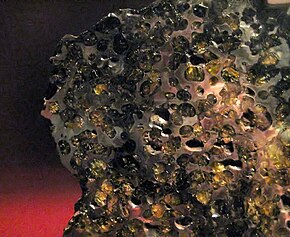Brenham (meteorite)
| Brenham | |
|---|---|
 | |
| Type | Stony–iron |
| Class | Pallasite |
| Group | Anomalous Pallasite (Pallasite-an)[1] |
| Composition | 8.5% Ni, 21.5 ppm Ga, 55.5 ppm Ge, 0.023 ppm Ir |
| Country | United States |
| Region | Kansas |
| Coordinates | 37°34′57″N 99°9′49″W / 37.58250°N 99.16361°W |
| Observed fall | No |
| Fall date | 20,000 years ago |
| Found date | 1882 |
| TKW | 4.3 tons[1] |
Brenham[1] is a pallasite meteorite found near Haviland, a small town in Kiowa County, Kansas, United States. Pallasites are a type of stony–iron meteorite that when cut and polished show yellowish olivine (peridot) crystals.
The Brenham meteorite is associated with the Haviland Crater.
History
[edit]In 1949, a collector named H.O. Stockwell discovered a mass of 453.6 kilograms (1,000 lb),[2] known at the time as "The World's Largest Pallasite Meteorite."
In October 2005, geologist Philip Mani and meteorite hunter Steve Arnold located[where?] and recovered the largest fragment ever found of Brenham: a single pallasite mass of 650 kilograms (1,430 lb).[3]
Classification and composition
[edit]Brenham is an anomalous pallasite (Pallasite-an).[1]
Specimens
[edit]The 650 kilograms (1,430 lb) mass found by Mani and Arnold is currently housed in a private collection in Texas.
The 453.6 kilograms (1,000 lb) mass discovered in 1949 is called The Space Wanderer and is on display at The Big Well in Greensburg, Kansas. It was found, and excavated using hand tools, on the Ellis Peck farm, east of Greensburg, Kansas.
A large collection of Brenham meteorites, along with numerous fragments weighing a total of 8,500 pounds, were once housed at the now-closed Kansas Meteorite Museum and Nature Center in Haviland, Kansas.[4][5]
-
Fragment housed in the Fort Worth Museum of Science and History
-
Specimen almost olivine-less
-
Small slice at the Harvard Museum of Natural History
-
Meteorite at Big Well museum in Greensburg, Kansas
See also
[edit]References
[edit]- ^ a b c d Meteoritical Bulletin Database: Brenham
- ^ Catalogue of Meteorites Reference Book with CD-ROM October, 2000.
- ^ Geotimes: Mammoth meteorite unearthed, January, 2006.
- ^ Kansas Meteorite Museum and Nature Center
- ^ Zink, Adrian (2017). Hidden History of Kansas. Charleston, SC: The History Press. p. 64. ISBN 9781625858894. Retrieved 28 December 2018.
External links
[edit] Media related to Brenham (meteorite) at Wikimedia Commons
Media related to Brenham (meteorite) at Wikimedia Commons- The largest recovered Brenham oriented fragment on World Record Meteorite Website




